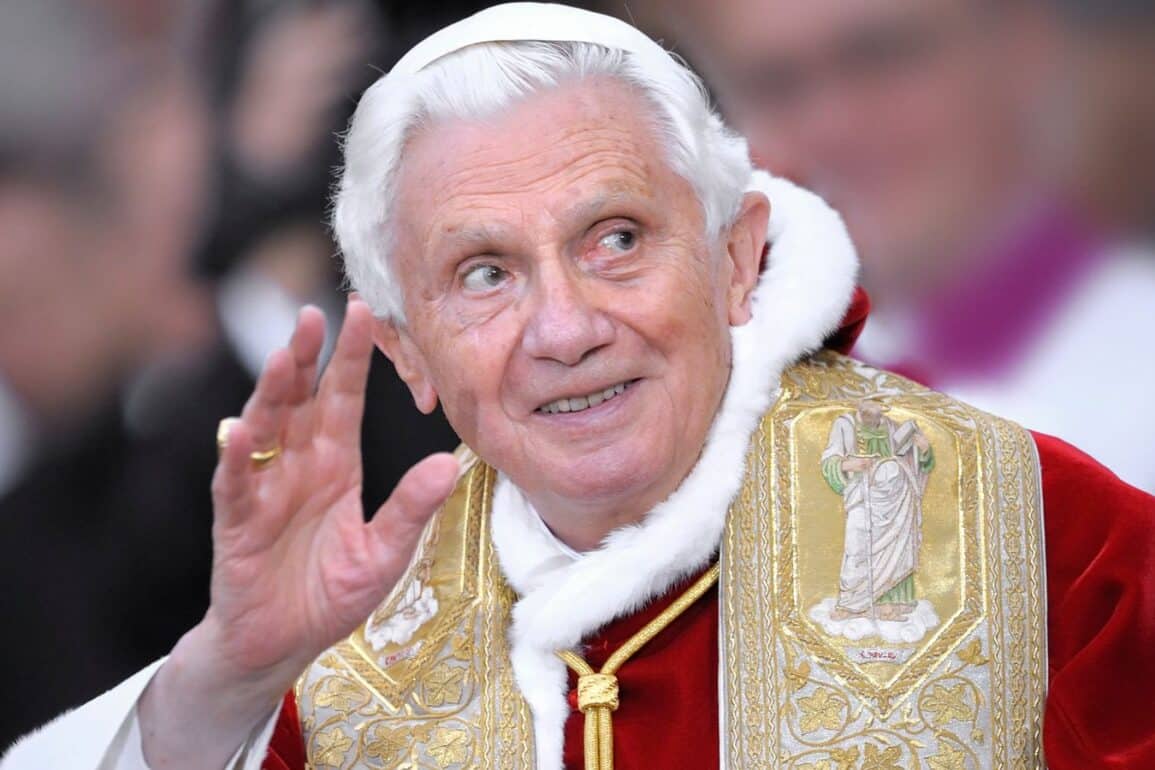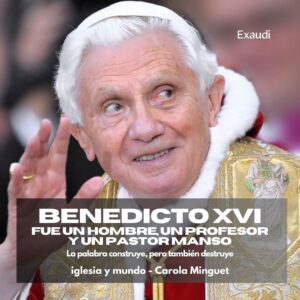The Catholic University of Valencia (UCV) has presented with a round table the book The pontificate of Benedict XVI through the journalistic story (Tirant lo Blanch, 2024), the work of the journalist Carola Minguet, director of Communication at the UCV itself. The monograph, an analysis of the informative treatment given by the newspaper El País to the papacy of Joseph Ratzinger, has its “interest” not only in examining the image “about his person and mission” projected by the said newspaper but also wants to help the reader “to understand how the press shapes reality through the journalistic message”
On the other hand, Minguet confesses the double personal commitment behind the work: a thank you to Benedict XVI and a vindication of journalism, “a precious and misunderstood, necessary and threatened profession.” Both purposes explain my effort to show what has entailed a journalistic exercise that, continuously over time, has focused on what could denigrate a key figure of our time. Ratzinger was not like so many media outlets have said. There was nothing of a Rottweiler in him, nor a grand inquisitor, according to the headline in El País on the day of his election. “Benedict XVI was a man, a teacher, and a meek pastor,” she remarks.
The view of El País was “particularly obscurantist”
One of the main features of El País’s news approach regarding Benedict XVI is, in Minguet’s opinion, the “conflict”, in a “narrative” that has revealed “a particularly obscurantist view of this pontificate.” This approach has been established in the Madrid newspaper “since Ratzinger’s appointment” and has prevailed “in most issues, thus confirming that, in the information treatment of the Catholic Church, controversy not only prevails in the election of content, but also in the story of the same”.
The treatment of the Church in the national general press is usually simplistic, which ends up building an incomplete image of it. This statement does not arise, furthermore, from a personal opinion or a particular judgment, but from studies that confirm certain deficiencies in the media when the religious fact is addressed, the author asserts.
Minguet exposes in her work three factors that contribute to the wrong representation of Catholicism not only in El País but in other Spanish newspapers: The submission of religious reality to the formats and routines of the non-denominational press; the relations between the Church and the media, wrapped in a special climate of suspicion; as well as the anecdotal inclusion of religious information among journalistic areas of specialization. If highly trained editors are required in other areas, it should be no less in this area, whose prominence is evident in the media; “The Church is new every day.”
In the specific case of the newspaper analyzed in her research, the author affirms that there has been a “lack of precision in the news events analyzed”, a lack that has not only come from “certain professional routines”, but also from the particular way in which El País approached this pontificate. “In journalism, as in photography, the focus determines the clarity of the portrait: if you want a clear image you have to keep a distance; otherwise, the camera will not be able to focus, and the image will be distorted.”
When the author talks about distorting, she does not mean “inventing,” but rather “twisting the arrangement of the figures.” And that of Benedict XVI has remained “blurred, appealing to old clichés.” Although “it is common for the actions or words of a public representative to be misunderstood by the media at some point,” the German pope was the target of sinuous stories that overshadowed a strong and at the same time delicate, serene personality. Ratzinger has been a cooperator of the truth, aware and convinced that one can only cooperate with the truth from humility. He has been a pope of the word, reason and the heart. “A luminous word, a reason and a heart,” he says.
“The word builds, but it also destroys”
Minguet points out that “I have not intended to prosecute a communication group, but rather to put on the table the need for a treatment of religious information capable of the same rigor as other thematic areas. The reader has the right to rigorous information about all human and social realities. However, there are theorists who have been warning for years that in Spain this journalistic function relaxes when the information object is the Church,” she argues.
According to the journalist, the processing of information related to the ecclesial institution presents dysfunctions that not only repeat themselves as time passes, but also worsen. The Church is seen as a political organization, which does not respond to its nature or its mission.
On the other hand, in her opinion, “informative quality goes beyond compliance with extrinsic standards, verifying data or contrasting sources. She also asks for a clean look that renounces the lenses of ideology and a fair language; that is, adjusted to reality. And the word is not neutral, accessory, accidental… in any way. Adjectives, nouns, verbs… can reveal and hide, hint and deny, illustrate and confuse. The word builds, but also destroys. Therefore, when writing one does, or does not, an act of justice,” she says.
The professor at the University of Navarra, Pablo Blanco, specialized in Dogmatic Theology and Ecumenism, and member of the editing committee of the complete works of Joseph Ratzinger in the Spanish language, participated in the presentation ceremony of The Pontificate of Benedict XVI through the journalistic story, as well as the author of Benedict XVI: The German Pope; and the journalists María José Pou, expert in social and religious journalism, professor at the CEU Cardinal Herrera University and columnist in the newspaper Las Provincias; and José Francisco Serrano, professor at the CEU San Pablo University and member of the Board of Directors of the Madrid Press Association.











